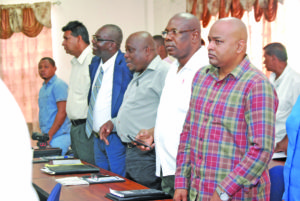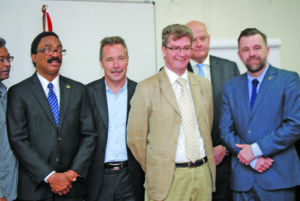A two-week training exercise intended to assist investigators in the fight against bribery and corruption has been launched by the Public Security Ministry under the auspices of the United Kingdom High Commission.
UK High Commissioner Gregory Quinn stressed the need for persons to be held accountable for bribery and corruption. He made it clear thus: “There is no place for corruption within security agencies in Guyana. If officials or individuals cannot work with honesty and integrity, then they should be…prosecuted and imprisoned as necessary,” Quinn stated.


“If people don’t like the sound of that, then frankly (that’s) tough. Security agencies cannot expect respect and cooperation from the public if they themselves are not willing to operate within, and be subject to, the law. All of you can and must set the examples for everyone to follow,” he expanded.
In his address to the participants, Attorney General and Minister of Legal Affairs, Basil Williams, noted that the training was especially important with Guyana preparing for operation of the oil and gas sector.
“To successfully fight against corruption, there has to be effective detection, investigation, analysis of evidence, and prosecution of crime, ultimately leading to convictions. It is for this reason that this course is important,” Williams stressed.
The training is expected to be conducted by two UK experts who are experienced in anti-money laundering and white-collar crime investigations. It is understood that investigators from the Special Organised Crime Unit (SOCU), the Customs Anti- Narcotics Unit (CANU), the Criminal Investigation Department (CID), the State Assets Recovery Unit (SARU), and the Financial Intelligence Unit (FIU) are participating in the training.
Also present at the opening were Public Security Minister, Khemraj Ramjattan; Acting Police Commissioner David Ramnarine, and the UK’s Special Advisor attached to the Special Organised Crime Unit, Sam Sittlington.
There have been, for locals, several training initiatives wherein UK specialists have been involved. Last year, local immigration officers underwent the Risk and Liaison Overseas Network (RALON) training conducted by the UK’s Immigration Enforcement International.
The training had covered three fundamental issues: overview of human trafficking, enhancing of interview skills when dealing with arriving passengers, and overall increased awareness of the latest trends and concerns in the wider Caribbean.
The UK has done much of its security sector collaboration through the security reform project, which began in 2007 and was scrapped in 2009, after the British Government had requested to have oversight of the programme to ensure that there was ‘value for money’.
The former Government had disagreed with the manner in which the British Government had wanted the programme to be run, claiming that Britain had sought to intrude upon Guyana’s sovereignty.
However, the British Government has said the Government of Guyana had submitted a different proposal, one which had focused on Police modernisation rather than a holistic approach to reform. The intention was to build a workable basis for improving national security while reducing crime in Guyana.
Government believes that, once implemented, Guyana’s security sector will be significantly strengthened, and hopefully, this will lead to a reduction in the number of illicit activities that take place.
President David Granger has also said there is need for a stronger Police Force, one that is better equipped with all tools necessary to function adequately.



